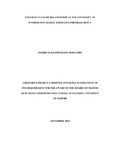| dc.description.abstract | Organizations today are increasingly facing a number of challenges in their operations
in various settings. In adopting various strategies to stem the challenges faced, they
need to be informed of factors that affect their performance and the operationalization
of the chosen strategies. Key to the success of every organization is the role played by
its work culture. This study looked at the strategy-culture relationship within
University of Washington Global Assistance Program-Kenya. Content analysis
methodology was used in data analysis. The key findings of the study were that the
organization adopted its work culture from the parent company from a different
national setting, the adopted culture was not in tone with the Kenyan national culture
and the organization founders had little say on the work culture used in the
organization. The organization’s culture had been modified over time to keep it in
tone with the national culture and the leadership view of the organization.
Additionally, its strategies that were also adopted from the parent organization had
been revised to suit the work culture adopted as a result of the difficulties that had
been experienced with the institutionalizing the same. The study concluded that
change in the organization’s culture causes a resultant change in it strategies whilst
overtime evolution of strategies causes a resultant modification of the organizational
work culture if it’s to maintain its competitive advantage. The study recommends that
managers of the organization be given the authority to determine the work culture and
strategies to be used within the organization and not be obliged to adopt those of the
parent organization. Additionally, the organization needs time before it can fully
formalize its systems thus the management need to ensure that there’s presence of a
strong but flexible work culture to guide current and future organizational
interactions. Limitations seen in this study are that the results of the study may not
apply to all the organizations in the same setting given and that some degree of
generalization is hypothetical. Further the study faces the limitation of its conclusion
being personal opinion as there was only one company under study as opposed to
several whose data could be compared. The methodology adopted is also descriptive
and is limited by data availability. The study suggests its replication within the same
industry to validate the findings or find new relationships between the two concepts.
Further it recommends analyzing the relationship of these two concepts in light of a
third concept of performance. Lastly the study recommends the use of complementary
research methods specifically qualitative research in establishing content rich
interpretation of the research results. | en_US |

